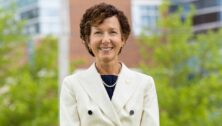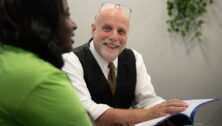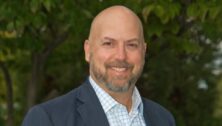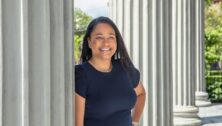Philadelphia Leadership: Karen Barsoum, Director, Chester County Voter Services
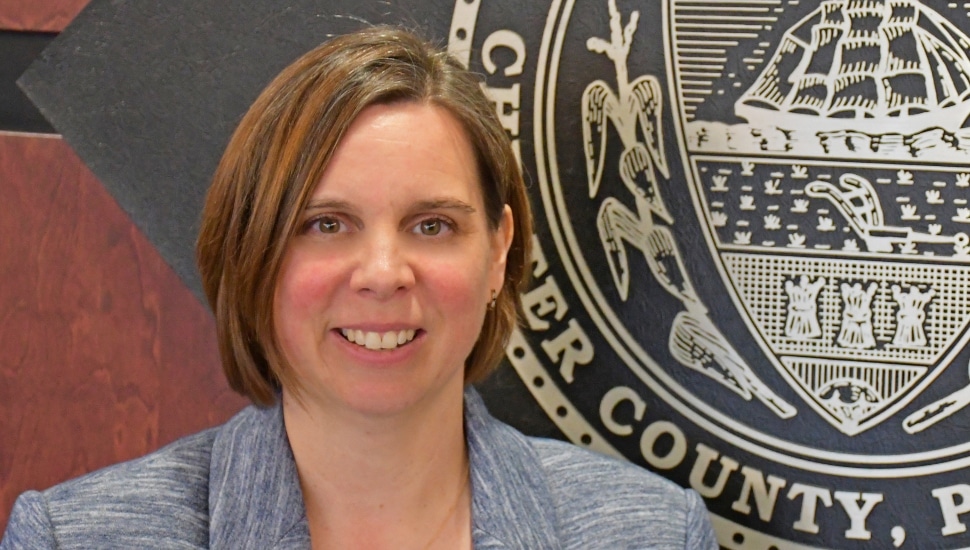
Karen Barsoum, Director of Chester County Voter Services, spoke with PHILADELPHIA Today about growing up in a tiny village in the Netherlands, where her dad owned the only grocery store. She was always eager to see more of the world, seeking out a high school, college, and a job in a larger city.
Barsoum met her now-husband on a trip to Egypt, immigrated to the United States, and became an American citizen. Her career began in graphic design, but she took a job in county government during the recession, which eventually led to her work with elections. Now, she’s preparing for the next presidential election, making sure the voting process in Chester County is secure and transparent.
Where were you born and where did you grow up?
I was born in a very small village in the Netherlands called Sterksel, in the south where Germany, Belgium, and the Netherlands come together. The village was so small that there was just one supermarket, which was operated by my dad. My mom set up the local daycare and my dad also carried the mail. Everyone had farms. There was one school and one church.
What memories stay with you from growing up in Sterksel?
It was a close community. Everyone contributed to something. People weren’t commuting as much to other places to have another job. We had the local person with the eggs, the local person with the veggies, and the local person making the bread.
There was a lot of history from World War II in the area where I grew up. My great-grandma lived next to the train tracks. People were being deported to Germany and jumped off the train, and she hid them from danger via a trapdoor underneath the carpet in her living room. My grandfather provided food, lodging, clothing, and provided a bike to allied personnel and was awarded for such.

Did you have any part-time jobs growing up?
I helped my dad, obviously, but I never saw my dad as a real boss because he was too kind. If he knew that I had something going on late with my friends, he would be forgiving if I wasn’t there right at 7:00 AM. I realized that I needed a real experience, a real job.
I saw that the butcher shop needed somebody to clean, which is a less sanitary position than the job with my dad. But it came with more responsibilities, which I felt was more meaningful than working for my dad. I also helped my mom at daycare sometimes, at the local preschool, but it didn’t feel like a real job.
What lessons did you learn from those early jobs that still stick with you today?
I learned I never can start at the top. Cleaning the butcher shop created a sense of having a job, having responsibilities, being on time, learning new skills, and growing from there. The job itself might not have been the best, but it’s the camaraderie and the coworkers and getting a paycheck and feeling part of something.
When I got older, I wanted to do something a little nicer. The job that I had during the end of high school and college was in a women’s fashion store. I was good in sales because I was good at talking to people and combining designs and colors. That was in the city, so I got out of the village. I was always looking further than where I was. I wanted to get a job in the city. I wanted to go to college further away.
What drove you to look for life in the city and outside your village, Karen?
It’s not that I’m not satisfied easily, but I always look for the next thing. I still do. It’s not necessarily a feeling that I have to move, but I like to keep up with technology and education. I like to improve things. I like to empower people.
Where does that sense of curiosity come from?
I don’t know. There’s a lot of nice things outside of the box.
Was it from your parents?
My dad is from the village of Sterksel, one of 13 children. My mom is more adventurous. Her family traveled more and lived more in the cities. She took us on city trips and to see musicals.
What about high school? Did you play any sports in high school?
That’s very much a question for the culture here in America. In Holland, everyone participates in gym, but there are less organized high school and college sports. I danced basically my entire time in the Netherlands, including classical ballet, jazz, and Latin and ballroom dancing.
Well, what did you do to distinguish yourself in high school?
I always got along with a lot of different people. I’m very much a mediator or a neutral person. I don’t take sides. That benefits me in my job right now. I was also very creative, so my art projects were really good. I put a lot of effort into projects, making things look nice, and going above and beyond in research.
In the Netherlands, you don’t go to high school according to where you live. You pick something where you really aspire to go to. And again, I picked something a little further away. I had to go one hour each way by bike in the rain, wind, snow, or ice. There was no school bus.
Wow. What about music? What kind of music floated your boat in high school and after high school?
I like all kinds of music, like what was popular at that time, which would have been Michael Jackson and Madonna. And then there’s the Spice Girls. But I also enjoyed going with my mom to musicals or listening to more relaxing music.
When you got ready to go to college, how did you decide where to go and what to major in?
There were two things that I was deciding between. I either wanted to do something with talking to people, therapeutic — like a psychologist, but more in a creative therapy realm — or be creative myself. When I decided I liked to be creative myself, there were two choices for college.
I ended up choosing Utrecht Fine Arts, in the middle of the Netherlands. Again, it took me three hours a day to travel there and back.
I wanted to be creative but with a reason. For instance, instead of focusing on how you personally feel, consider how shoppers experience the store. Think about their reactions to the products, colors, textures, and smells. How do these elements influence their perception and behavior? This is more about graphical visual merchandising and understanding marketing statistics.
Was that a good choice for you, going to that college and that career?
Yes. All those skills like marketing, branding, and statistical data analogies I use now. My follow-up option would have been more marketing-driven. But then I met my now-husband. The year that I had internships in my college, I had some time off between two internships. I asked my mom to go with me on a trip. We went to Egypt, I met the tour operator. Let’s just say I took a tour for life — because he’s now my husband.
When you came out of school, who saw promise in you?
When I met my husband, 25 years ago, he was in the process of immigrating to the United States. When I finished college, I visited him in the United States to figure out my life and to see if this was really something permanent or just — like some of my friends were thinking — like being in love with your ski instructor. I was also interested in doing a year of travel to New Zealand, Australia, something else adventurous. But when I came to the United States, everything did work out.
I was able to obtain an H-1B visa work permit as a Graphic Designer in the Delaware County area. My first work experience in the United States was designing logos, signs, and trade show booths.

Who saw promise in you? Who saw potential when you came to the States as you were starting your career?
I always say everything happens for a reason. In 2010, when I had my son, I was laid off. That was a very bad time. There was a recession. So, when I was looking for another job that would be meaningful and could be a career, I first ended up as an Executive Assistant to the Principal of Twin Valley High School. I liked that job. It gave me a lot of freedom to redesign a portal on the computer and modernize the program for substitute teachers to clock in.
But while I was looking for a job, I also applied as the Executive Assistant to the Managing Director of the city of Reading. And while I was at Twin Valley, he contacted me. It was a hard choice, but taking that job was the best thing I could do. He was the Managing Director for the city, which exposed me to local government. The city of Reading is bilingual. Even though I don’t speak Spanish, I was taught French, German, English, and Dutch in the Netherlands. I could relate to people who were of different backgrounds.
When he was approached to become the Chief Operating Officer for the County of Berks, he asked me if I would consider staying as his Executive Assistant, which would be in the office of the Commissioners. That was an awesome turn. I did a lot of projects in Berks in a lot of different departments.
And then the 2012 presidential election happened. The director of elections in Berks asked me to come and help. There was an opening for the Assistant Director there. I applied for it, and I am here.
How did you get to Chester County?
In October 2020, my Director of Elections in Berks left quite promptly. I ran for the 2020 election in Berks as the Assistant Director. When that election was done, I felt comfortable in my capabilities, and I felt I could reach the next level in my career.
There were so many opportunities to work in election departments across the state, especially in this area. What attracted me to Chester County was the opportunity to be creative and put my touches on some things. It was convenient for me that the voting system was exactly the same, so I already had extensive training on the voting equipment. I was comfortable leading a bigger team in a new role with things that I already was comfortable with.
So, you’re here in Chester County and you’re getting ready for another presidential election. What are your priorities?
From the moment that I came here, there were a lot of major projects to address. First, we focused on mail-in ballots — obviously, that operation was new — then we refocused on in-person voting, to make sure it was the best it could be. Now we are at a point where my focus can be on what I really enjoy: voter education, outreach, making sure that people are feeling safe and secure, that people know the team, that they have an opportunity to ask questions, and that they see that we are transparent.
I’m focusing on ensuring the security of all our assets, including the voting system and our staff. This involves monitoring activities at polling places, providing necessary tools, and ensuring that all third parties are properly informed. We are coordinating with many different agencies, both internal and external, as part of this major election project.
How do you convey the integrity that you work so hard to bring to the system?
There are a lot of layers to it. In our poll worker training, we provide them with a lot of election information. They are our ambassadors in the community, and they can relay accurate messages.
We also try to show more behind-the-scenes activities that take place at Voter Services. We have a lot of educational videos that we’ve developed over the last few years. We have 24/7 surveillance cameras in some key areas where people can sit at home and observe what is going on.
We go into the community a lot more; we have attended several events and fairs, and we have provided more information on our social media pages. My management team and I are keeping up with everything that’s going on, from participating with other counties and even nationally on certain programs to keeping up with AI and how it affects us. Nothing is stagnant. It’s constantly evolving.
I want people to know that, along with the Department of State, we are a trusted source of original information and data. I think when things are being unraveled and the whole picture isn’t seen, that’s where distrust or misinformation comes from.
What do you do with all that free time that you have?
I have a toddler and a teenager. We love to spend family time. We also love to introduce them to different cultures, foods, and some travel if possible.
Do you get back to Holland much?
Not as much. Thankfully, my parents still are able to travel. They have been here more often because since I had a little one, they are my in-home nannies during election season. They traveled here during the primary, and they will be traveling again for the general election to take care of everything in the house while I am overseeing the full election process.
What’s something big that you’ve changed your mind about, Karen, over the last 10 years?
In 2016, messages on social media and communication about the presidential election were very heated. A lot of people, including friends, were pretty mean when it came to political differences, and they also sent unfriendly, harsh messages to me privately. At that time, it seemed personal.
I don’t take those attacks personally anymore. I’m sad that people act like that towards each other, but I don’t feel like I have to wear a coat of armor and fight all of that with friends. If I lose friends over that, then they wouldn’t be real friends.
What keeps you hopeful and optimistic, Karen?
We always come out on the other side. When things change, it doesn’t necessarily mean that for everyone, their whole life is going to change. It’s adapting to some things or seeing things from another point of view. I am optimistic that people will be able to navigate things together, even if it’s a scary place to be. We don’t know what tomorrow brings, or next year, but there’s always something new or something to look forward to, or something exciting, or something you can be creative about or learn from.
We learned a lot from the 2020 presidential election. Elections definitely don’t look the same as they looked then. They were more contentious, possibly because of the lack of knowledge and trust in the process. But we found a way through it. And things now are safer, more secure, and more transparent than ever.
Finally, Karen, what’s the best advice you’ve ever received?
There have been a lot of people along the way who taught me to go further and push boundaries. My parents never held me back when I wanted to go far to college, date a man from Egypt, go on vacation to America, or immigrate. I’m sure it was hard for them, but they let me do it. That brought me to where I am today.
I am a very realistic person. My husband always tells me I can find 20 different reasons why I shouldn’t do something. But he always says, “Go for it.” That’s what I see all the time and what I try to show the team.
Connect With Your Community
Subscribe for stories that matter!
"*" indicates required fields





















